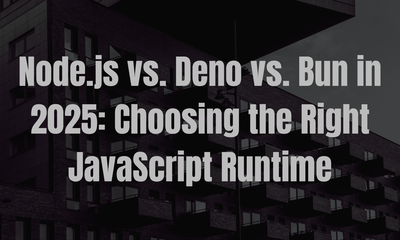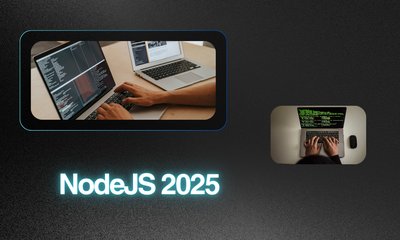Node.js vs. Deno vs. Bun in 2025: Choosing the Right JavaScript Runtime
By hungpd, at: Aug. 29, 2025, 3:44 p.m.
Estimated Reading Time: __READING_TIME__ minutes


1. Introduction: The Runtime Landscape in 2025
Node.js has reigned as the go-to JavaScript runtime for over a decade, powering APIs, CLIs, and full-stack applications with its mature ecosystem and stability. But the past few years have seen the rise of two compelling alternatives:
-
Deno: designed by Node’s creator to address security and modern JavaScript shortcomings.
-
Bun: a lightning-fast, all-in-one runtime built with performance and developer experience in mind.
Understanding their respective strengths and weaknesses is crucial for selecting the right tool for modern development workflows.
2. Historical Context and Philosophical Roots
| Runtime | Origin & Philosophy |
|---|---|
| Node.js | Launched in 2009 by Ryan Dahl, built on V8 with non-blocking I/O and the npm registry that exploded into the largest package ecosystem. Prioritizes stability, compatibility, and ecosystem growth. |
| Deno | Released in 2020 by Ryan Dahl as a response to Node’s shortcomings. Written in Rust, it emphasizes security by default, ships with TypeScript support, and uses URL-based imports instead of node_modules. |
| Bun | Introduced in 2021, built in Zig with a focus on raw speed. Marketed as an all-in-one toolkit: runtime, bundler, transpiler, and test runner. Prioritizes developer convenience and Node.js/npm compatibility. |
3. Feature Matrix
| Aspect | Node.js 24 | Deno | Bun |
|---|---|---|---|
| Security | Opt-in permissions model (new in Node.js 24) | Secure by default (`--allow-*` flags required) | No sandbox; mirrors Node’s behavior |
| Performance | Stable with improvements | ~40k req/sec (M2 chip) | ~70k+ req/sec (M2 chip), fastest available |
| Ecosystem | Massive npm registry; excellent tooling | Smaller, growing ecosystem | npm-compatible, but still maturing |
| Developer Experience | Requires external toolchain (bundlers, test runners) | Built-in TS, testing, linting; browser-like APIs | All-in-one (bundler, transpiler, test runner) with zero config |
| Maturity & Stability | Battle-tested with long-term support | Young but steadily growing; design-first | Very young; rapidly evolving |
4. Benchmarking Realities
Verdict: Bun leads in raw performance, followed by Deno; Node.js remains robust and reliable.
5. When Each Runtime Shines
-
Ideal for enterprise backends, legacy systems, and when ecosystem depth matters.
-
Continues to adapt with features like a permissions model, test runner, and WebSocket API.
-
Great for secure CLIs, SaaS apps, and environments where sandboxing is critical.
-
Offers TypeScript and web-compatible APIs out-of-the-box.
-
Perfect fit for speed-first development: prototyping, internal tooling, edge functions.
-
Integrated tooling (bundler, test runner) minimizes setup and speeds up developer workflows.
6. Trade-offs & Real Developer Perspectives
| Runtime | Benefits | Trade-offs |
|---|---|---|
| Node.js | Stability, massive npm ecosystem, well-established enterprise adoption, and long-term support releases. | Heavier tooling setup, historically weaker security defaults, and slower pace compared to newer runtimes. |
| Deno | Security-first design, built-in TypeScript, modern browser-like APIs, and simplified dependency management via URL imports. | Smaller ecosystem, package fragmentation, and adoption barriers for teams heavily invested in CommonJS/npm. |
| Bun | Blazing fast performance, integrated bundler/test runner, zero-config setup, and npm compatibility for developer convenience. | Immature ecosystem, evolving APIs, potential instability in production, and risk of early lock-in. |
| Community Perspective | Many developers praise Node.js for its simplicity and reliability, Deno for its security, and Bun for its speed. | A Reddit thread summarized it humorously: “Node is the best and simplest… Deno forces types… while Bun imposes bugs.” |
Community Wisdom
A Reddit thread notes:
“Node is the best and simplest… Deno forces types… while Bun imposes bugs.”
Offers a humorous and pointed reminder: simplicity is a virtue; speed and novelty come with caveats.
7. Best Practices Based on Context
-
Stable Enterprise Workflows: Stick with Node.js 24 for reliability and mature tooling.
-
Security-First Deployments: Deno is your runtime, especially for edge or regulated environments.
-
Performance and Developer Speed: Choose Bun for blazing-fast development with minimal setup, but be wary of early-phase moves.
8. Conclusion
There is no universal “best” runtime, the right choice depends on your priorities:
-
Node.js = safe, stable, and dependable
-
Deno = secure, modern, efficient
-
Bun = performance explosion and tooling simplicity
Understanding their unique strengths and limitations lets you build smarter, not harder.


![[One Package Per Day] pino - The Logger We Trust in Node.js Projects](/media/filer_public_thumbnails/filer_public/ad/85/ad854393-ffb3-4df5-8289-a75820e66da7/pino_logging_-_nodejs.png__400x240_q85_crop_subsampling-2_upscale.jpg)


